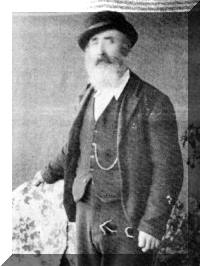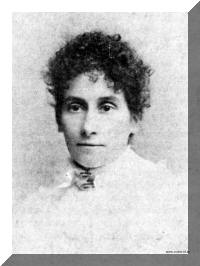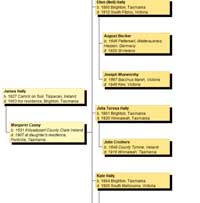Samuel George Walker and Sarah Crawford
2-Samuel George Walker was born on 13 Mar 1841 in Tottington, Norfolk, England, was christened on 10 Oct 1841 in St Andrews Church, Tottington, Norfolk, and died on 20 Jan 1912 at age 70.
Samuel married Sarah Crawford, daughter of convict Thomas Crawford and Mary Webb, on 25 Dec 1861 in Westbury, Tasmania. Sarah was born on 15 Mar 1842 and died on 3 Jul 1923 at age 81.
They had 13 children:
- Samuel Francis
- Robert Wilson
- Alice Ada
- Agnes Selina
- Sarah Anne
- Arthur William
- James Albert
- Isaac Henry Thomas
- Annie May
- Edgar Oswald
- Leslie John
- Mildred Mary and
- Victor Maurice.
Samuel George Walker, third son and third child of Michael and Sarah, was born at Sturston, Norfolk, on 13th March 1841, and baptised at St. Andrew's Church, Tottington, on 10th October, 1841. A photocopy of the register of baptisms, now kept at the Norfolk Records Office, shows Samuel's name at the top of page 47, as entry No. 369. A further seven entries, three for girls, complete the page, which covers a period of somewhat more than nine months, ending on 28th July, 1842. Only two of the infants received more than one Christian name: our Samuel George, and one Michael Forster Marner Sutton, son of a farmer. One other parent is described as a gamekeeper, one as a warrener, and the rest, including our Michael, as labourers. All parents other than Michael and Sarah are shown as living at Tottington. All ceremonies were performed by Rev. H. C. Hare, Curate, who made his entries in a somewhat spidery hand of which Michael's signatures are midly reminiscent.
The printed heading of the page reads: "Baptisms solemnised in the Parish of Tottington" and two column headings "Child's Christian Name" and Quality, Trade, or Profeffion", which may account for Michael's use of "f" for "s" on his cheque butts, a practice he was still following some forty years later, long after it had been generally abandoned.
Sam's baptism took place a mere ten days prior to the date inscribed in the bible presented to Michael by Rev. Edward Simons, Rector of Sturston. At the time the church at Sturston may already have fallen into disrepair and been no longer in use. Sturston had been enclosed long before Tottington, and records concerning the enclosure state that all buildings in the village of Sturston had been pulled down with the exception of the owner's Hall and the Rectory. The outcome would presumably have been the removal of the congregation which had previously worshipped at Sturston, thus leaving little reason for keeping the church in repair. However, the Rector must still have been residing in the Rectory, and Michael may have been living in a cottage near the Rectory or the Hall, employed at one or the other or both.
Since Michael and Sarah had lost their second child, John, on the voyage to Van Diemen's Land, the family group that settled on Annandale would have consisted of Michael and Sarah, in their later twenties, William, approximately six years and four months, and Sam, approximately twelve months. To date little of a factual nature is known concerning Sam's childhood, yet in more than one of the branches rumours have persisted that he was spoilt.
The fact that Sam was a good five years younger than William, and the probability that Sarah might be inclined to lavish additional affection on Sam after the loss of John, could have given rise to such rumours without other evidence, as could the fact that Sarah's fourth son, John, was not born until 13th September, 1843, two and a half years after the birth of Samuel. Samuel would thus have had a period of almost two years in which to enjoy the major part of Sarah's attention. The situation would have changed drastically as Sarah's lengthy succession of young children arrived, diverting her attention away from Sam. Sam may have reacted unfavourably to a lessening of the time his mother could spend with him.
Sam's history remains a virtual blank until his marriage with Sarah Crawford, his junior by just over a year. She was to survive him by thirty-four years. Sarah was the daughter of Thomas Crawford and his wife Mary, nee Webb. Statements and records are in conflict as to when Sarah's only blood brother, Francis was born. He is believed to have later married Elizabeth Clarke and settled at Northdown.
Thomas Crawford had arrived in Van Diemen's Land as a convict in 1833, and been freed five years later. He was married in 1841 and his children were born in the Westbury area. A family story relates that one John Morris framed Thomas for highway robbery. He was tried at Launceston and was condemned to death, but the sentence was commuted to four or five years on Norfolk Island. Morris then moved in with Mary and they had at least four children, one of the youngest being registered twice, once as "Morris" and once as "Crawford". Thomas Crawford is believed to have returned to Van Diemen's Land after serving his sentence and settled in the Huon area, where he married one Elizabeth Jones and had two children by her. He later returned to the north, and he and his wife are both buried in Bangor church cemetery.
Years later other stories of a scurrilous nature, involving characters bearing names mentioned above, were still current in Exton and elsewhere. One related to a single cuckoo in the nest, which arrived during his mother's husband's lengthy absence. Another tells that an illegitimate child was given the father's surname as a Christian name as an insult to the said father's family. The child in question went to school with the writer of these lines, and certainly resembled the alleged father in colouring and features. There were thus two stories, current at widely different periods of time, which may well have become confused at some time in the last sixty years. Norman Walker related another story concerning a man of about his own age, who on several occasions went to race meetings at Mowbray with Norman and son Jack.
Friend's father had sired an illegitimate son, but "took pity on the job" and adopted him. He grew up in friend's family, allegedly without finding out that he was in fact a blood relation. He later made good, rose to an important government position, became unpopular with a number of subordinates and was frequently referred to as "that illegitimate" by persons who had no idea that they were speaking the literal truth. Two or three variations on these yarns might have been added, but it was felt that there was sufficient scandal in the chapter already.
The first of Sam and Sarah's children, Samuel Francis Walker (first of Michael and Sarah's grandchildren), was born on 29th September, 1862, and married Ada Amelia Kate Scott. The second child, Michael Robert Wilson Walker, was born on 20th March, 1864, and married Sarah Fergusson. They later migrated to New Zealand. Sam and Sarah had a further eleven children. Little is known of some of them. The eighth child, Henry Thomas Walker, also migrated to New Zealand. Sam had become Michael and Sarah's oldest surviving child when his brother William was accidentally killed. Sam would then have been nine years of age.
Norman Walker's recollections of Samuel are set forth below.
When farm gates were being made or mended Norman sometimes recalled his Uncle Sam. He said that Sam made a certain amount of money at carpentry, and was well known for his gates. He regularly completed two in a day, and was a methodical worker, invariably setting out the timber for two gates on hurdles before he commenced.
It was also recalled that he had the Exton Hotel for a time. He was sometimes short of money, and would occasionally run a dance to help raise the rent. In spite of Sam's best efforts the financial position deteriorated until the day when two bailiffs arrived to take possession
of his cattle. They called at Sam's residence and were informed that the cattle were running on the recreation ground, so proceeded thither and started to round the up, watched by Sam, who according to Norman was looking pretty miserable.
At this stage Norman's maternal Uncle Jack Dawes arrived on the scene, with a length of heavy chain in his hand. He was a blacksmith, with a great reputation for ingenuity, and as a rule he and Sam didn't get on too well but in situations involving bailiffs parochial differences were speedily forgotten.
Without a word to anyone Jack fastened the gate, securing the chain with a large padlock. He then strolled across to the bailiffs and asked what they were doing. On of them told him. "Where's your 'thority?" asked Jack. "Oh", said the bailiff, "we left that up at the house"
Without more ado, Jack knocked him down. "Nov get", he said. The smitten bailiff picked himself up and got; his partner had already run away.
The whip-around customary in such crises followed as a matter of course, and friends and neighbours advanced enough to save the cattle. Jack Dawes had allegedly realised that the authority would have stated where the bailiffs could take possession, and that the recreation ground wouldn't have been mentioned. Whether or no, he saved Sam's cattle.
Many years later, as a drover, Norman sometimes speculated with sardonic amusement as to whether he was innocently figuring in a similar situation. He'd hang up the 'phone and remark to Jack that somebody wanted stock moved from somewhere or other early tomorrow, from the way they spoke preferably before first light, and by a specified route that wasn't the most obvious available. He often used the expression, "I can see a hole through a ladder", and discussion of implications and deductions would follow. Also saddling and/or harnessing.
The general principle or moral, to the best of Jack's recollection, was stated once and only once:
"... knows that once those cattle are on the road nobody will get them away from me."
It is believed that a number of Sam's children were later employed as bakers or chefs, or in the running of boarding houses or tea rooms.
Sam was probably the owner of a famous old gundog, one of the wonders of Exton in his day, who had a large number of shot pellets beneath his skin. "You could feel them all over him." He hadn't been shot accidentally, but as part of his training, designed to prevent him from approaching dangerously close to the birds he was indicating as targets. Whenever he came too close to a bird during training he was shot, the weapon used being a pistol with a reduced charge. Some owners claimed that dogs could be trained by use of a check cord; others maintained that a severer check was needed. Drovers sometimes used a thrown rock or shanghai to discourage dogs from biting sheep, making every effort to ensure that the dog didn't know where the missile came from. The idea was to bamboozle the dog into thinking that the pain came from the sheep as a natural consequence of biting.
A couple of other anecdotes probably relate to the branch of Robert or William rather than the branch of Sam, but are given here because they also concern hunting. One family of cousins hunted rabbits with homemade missiles: about a foot of old broom handle with a large nut screwed to one end. They were recalled as achieving fair results over distances of not more than twenty yards. Things were much more sophisticated in another family where the crack shot went forth accompanied by a gun bearer, who carried a second double-barrelled gun, and was there to reload both guns as required. The hunter wagered that he would kill the first twenty-five rabbits within range.
It was a great pleasure to see descendants of Sam's New Zealand branch of the family at the reunion, and to be able to direct them to the building which Sam once ran as an hotel; also to show them a photo of Jack Dawes, the man who saved Sam's cattle. The family interest in horses apparently lives on in them. They mentioned a string of racehorses, and we take this opportunity of wishing them luck.
It may be appropriate to include here another example of Jack Dawes' ingenuity: probably the first occasion on which the word was applied to him.
He had constructed a closet in which paper wasn't needed. Instead the operator pressed a handle, directing a jet of water in the required direction. A Minister of the Crown who happened to be visiting Exton had just seated himself when he accidentally pressed the button and darted forth in alarm with shirt tails flying. After matters had been explained he returned whence he had come, and on re-appearance delivered the following speech: ' 'Dawes is the most ingenious man I know. You can not only evacuate in his convenience, but lave your fundament at the same time."



